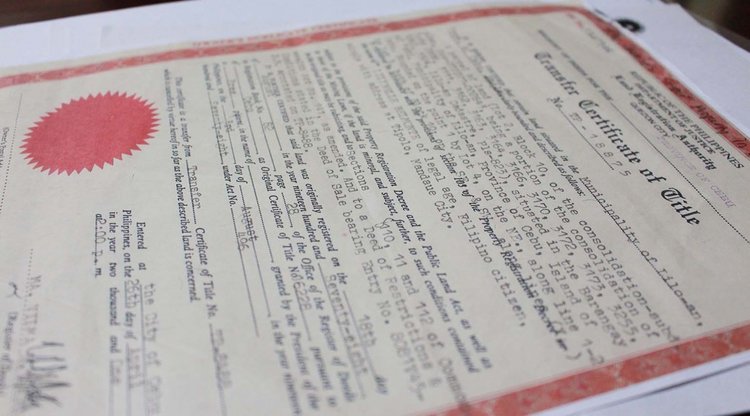
Can foreigners own land in the Philippines or not? If you’re confused about it then don’t worry, you’re not alone.
If one does an internet search about buying a home in the Philippines, the results can be more than confusing.
There are numerous articles about how to get around the property laws in the Philippines. None of these articles are truthful.
Foreigner Ownership of Land in the Philippines?
While the answer to the question “Can foreigners own land in the Philippines?” is technically yes, there are certain restrictions and regulations that must be followed.
It’s absolutely impossible for a foreigner to buy and own land in the Philippines despite what you might hear to the contrary.
“But, I can set up a corporation and the corporation can own property”.
Yes, you can set up a corporation. You can only own 40% of the Corporation, however. The other 60% must be owned by a Filipino. And yes, it can own property. So if you’re still asking ‘can foreigners own land in the Philippines?’, this is an ideal way for you to achieve your goal.
However, if you set that Corporation up purely so that you can own a piece of property that you can call your own and build your home on, you are, under Philippine law, operating illegally.
The Philippines constitution reserves all land in the Country for Filipinos only.
Foreigners are not allowed to own land. Period.
To prevent foreigners from trying “clever tricks” to get around the law, the Government and the courts will take the position that if you came up with a clever trick to get around the constitution, then that clever trick is illegal.
And that is basically their blanket way of making anything you might cleverly come up with (to get around the law regarding property ownership) illegal.
Can Foreigners Own Land in the Philippines?
If, what you mean by
There is only ONE exception to this and that is contained in Article XII of the Constitution Section 7 which allows foreign citizens to own land by way of legal inheritance.
HOWEVER, there is only one specific way that this legal inheritance occurs.
You cannot get married, have a will written leaving you the land and then, when your spouse dies, you become a legal owner. That is NOT legal.
Section 7 specifically says:
” Section 7. Save in cases of hereditary succession, no private lands shall be transferred or conveyed except to individuals, corporations, or associations qualified to acquire or hold lands of the public domain”.
And the key words are: “hereditary succession”.
Legally, what this means is that a foreigner can acquire land through intestate inheritance. These are default laws on inheritance which are not transfers of ownership by way of a last will and testament.
In other words, if your spouse does not leave a will regarding that property and if you are the next in line in succession (which means that she has no living parents of siblings), then you will inherit the land. If there are others in the line of succession, you will not. She cannot specifically will it to you as the Courts will view that non-constitutional as it is a way of getting around the rest of the constitution.
Can you Lease?
The law allows for foreigners to lease a piece of land for 50 years and renew the lease for another 25 years. On that land, you can build a house and the house will be owned by you. However, when the lease is over, you either have to demolish, remove or do something to get the house off that land, or the house becomes lost to you.

You can also own an Apartment. The law allows for 40% of apartments in any one complex to be sold to a foreigner. This follows the same 60/40 business ownership law. Essentially, 40% of the apartment complex ownership can be owned by foreigners.
Is Leasing a piece of Land safe?
Yes, and no. Depending upon who you lease the land from, the lease may be valid or may not be.
Here are the risks:
- The “landowner” is not really the landowner. Check titles carefully!
- The landowner passes away and the inheritors claim that they want you off the land. While that might be illegal, if they lock you out, it is a very expensive court battle to get back in.
- The title appears good, but someone else makes claims against the title and demands you leave.
- The land title is invalid for a variety of reasons (e.g. it is in a protected area or is in land that has been given to the indigenous people).
- If you are leasing land, it is much safer to lease it from a development that was set up specifically for leasing land to foreigners.
One example of such a project is Anahaw Village near Subic Bay.
Or alternatively, you can lease land from a Freeport Zone like Clark or Subic Bay Freeport Zone.
Whatever you do, always ensure you obtain a competent attorney to assist you in any lease you might sign.
But remember: If that attorney says that he can get around the law for you, he is not being honest.
Sections 3 and 8 of Article XII of the Constitution restrict the ownership of land by individuals to Filipinos and former Filipinos.
No law can override the constitution.
In conclusion, while finding an answer to the question “Can foreigners own land in the Philippines?” may seem complex and confusing, it is definitely possible with the right knowledge and guidance.



Accurate and useful information. Philippine law places non-philippine born citizens at a serious disadvantage (with regard to purchasing real estate) and in fact, makes them subject to being ripped off by an unscrupulous girlfriend or wife who might be listed as the owner of the land purchased with the husband or boyfriends money. Be careful when purchasing real estate. I read somewhere online that some guy was bragging about owning a farm with plenty of space vs. Somebody that owned a condo or a home in a housing tract… I am not sure that he is aware that in fact he really does not legally own the land.
I have lived in the Philippines for 8 years. Very true, foreigners can own condo, because there is NO LAND involved. If you marry a Filipina you can buy a home with a lot with your Filipino wife.
However, you need to realize even after the home is fully paid. Make no mistake about it, it belongs to the Filipino wife. What I really want to bring to your attention. It includes owning a condo. It can take YEARS to receive the Title. After the property has been paid in full.
Be aware even with the Philippine Retirement authority. They have a lien on your condo. It takes approximately a full year before you are able to have the PRA office lien released.
Does anyone have any experience in purchasing land in the name of their children rather than the mother/spouse?
Scenario : My filipina wife and I have 2 (now adult) children born in UK. I want to arrange for their citizenship in order to buy land in Philippines in their name for their future inheritance. My understanding is that once their citizenship is granted (via right of birth) I am then able to draft a power of attorney document to act on their behalf.
Any advise will be gratefully appreciated
You said that after the 25 years to lease the land, you must move or demolish the house. This may be obvious, but if you renew, does that just reset the timer and you no longer have to do so?
Your description of Hereditary Succession is accurate EXCEPT that you included “siblings” in the line of succession. This is not accurate. In addition to living parents, it also includes “Children.”
Hereditary Intestate laws are not explained correctly here. The Philippine Constitution is very clear about this. If a Filipina spouse passes away and the foreign national husband survives, and NO WILL is left by the decedent, then the Law of Intestate inheritance prevails. This is called out in the Civil Code, Book 3, Title IV, Chapter 3, Art. 960 through 1001, and can be researched if desired at https://philippinecivillaw.wordpress.com/tag/legal-or-intestate-succession/. If you read this law it is explained the ORDER of INHERITANCE: First it will be 100% to the foreign spouse if no legitimate children, illegitimate children, father, mother, siblings or nieces and nephews are surviving (up to 5 generations). If children, parents, and siblings with their children survive they receive 25% to legitimate/illegitimate children, 25% to parents, 25% to siblings and nieces and nephews, and 25% to surviving foreign spouse. If parents are deceased then it’s 50% to legitimate/illegitimate children, 25% to siblings and nieces and nephews, and 25% to spouse. The foreign spouse that inherits the land can only sell it to a Filipino citizen, and must offer it to any remaining descendants of spouse first at the current fair market value.
It seems that the US should then not allow Philippine citizens to own land in the US, and also apply this to any and all countries that have the same land ownership restrictions
I totally agree. Western countries, US, Canada and Australia stand out for allowing the third-world (often criminals) to wantonly buy real estate – when it is impossible for US,Canadian, or Australian citizens to do the same in their countries.. Australia has just waked up to the fact the Chinese nationals and others are using real estate here for money laundering. LOL – I could have told them that 20 years ago – it was so obvious. As far as the Philippines goes – they do need to liberalise land ownership somewhat with some common sense restrictions against Chinese illegals and the Chinese mafias that have crept in due to bribes, incompetence, etc.
Does anyone know of the actual process to get the land title in the Philippines? Please provide a link if possible. Isn’t the deed of sale required? Someone claimed that they did a land survey and got the title that way. But the deed of sale is in someone else’s name. So was that legal to put the title in someone else’s name?